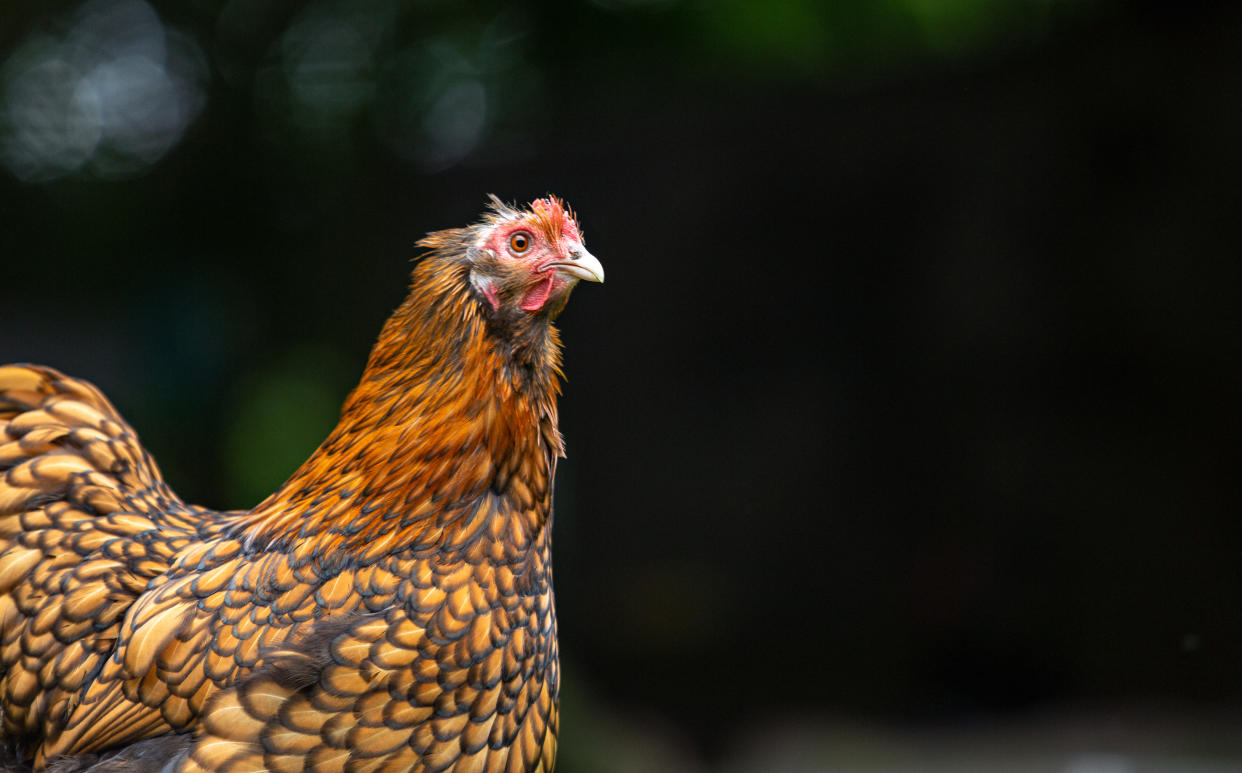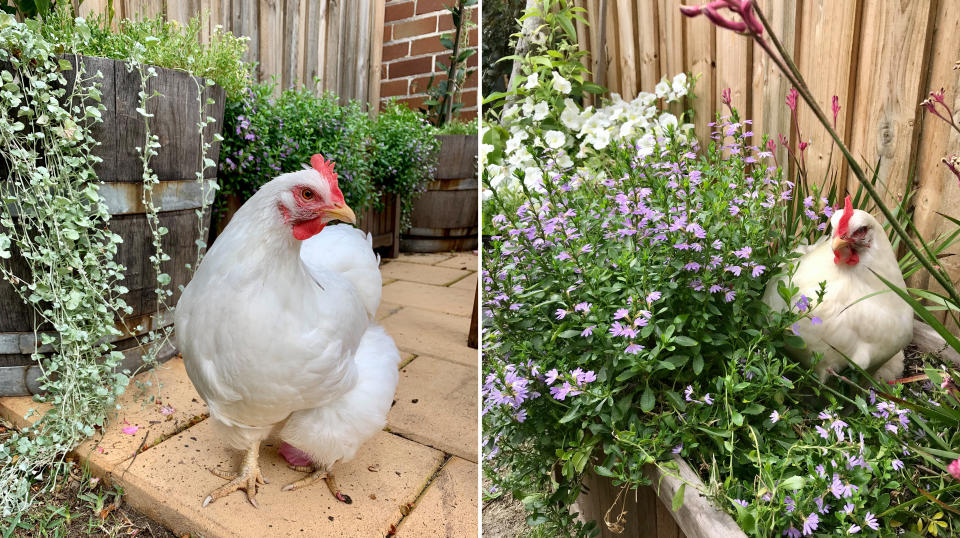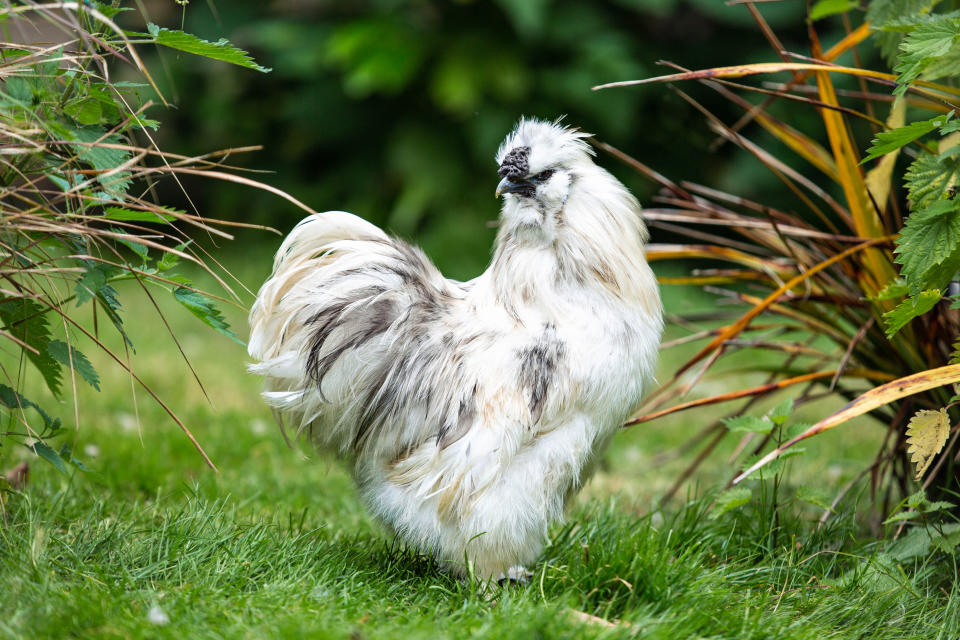Forget cats or dogs, chickens are the pets you should be bringing home in the new year

Many families welcome new pets into their homes over the summer holidays when they have a little time off to help them settle in.
But while many Aussies will be introducing cats and dogs to their loved ones, there’s an unexpected third pet whose popularity is steadily on the rise.
Chickens are making their way into more and more suburban backyards - including this writer’s - and for very good reason. Not only do our feathered friends embody the whole farm-to-table movement that’s seeing people become more informed about where their food is coming from, but they’re easy, fun and relatively cheap to keep.
In fact, research commissioned by ChickenGuard, says that 400,000 Aussies already have hens at home, and that many of those are families with young kids in the suburbs.
So if chickens are on your wishlist for the new year, here are some great reasons to convince everyone else to get on board the chook train.

They’re cheap to keep:
Besides the initial set up costs that come with creating a safe and comfortable hen home, chickens are extremely cost-effective pets.
You pay between $20-50 for a laying hen, and the only ongoing expenses are food and bedding material - and you can get both for less than $15 a month. That’s without subtracting the amount you’ll save from no longer purchasing eggs, but more on that later.
Chickens also don’t require regular vet check-ups like cats or dogs, so you’ll save a packet on medical bills and pet insurance.
They’re low maintenance:
One of the biggest differentiators between cat and dog ownership is the level of neediness involved. So, if you’re the kind of person who gravitates towards cats because there are no daily walks or sad separation eyes, then you’ll love chooks.

As long as they have fresh drinking water, access to their day’s worth of food (chickens graze all day long) and a safe space to roam, they pretty much take care of themselves. Your only other concern, and it’s one that shouldn’t be underestimated, is the threat of urban foxes at night.
All chicken coops need to be predator-proof which means having a sturdy base and a door that locks up at night. So the minimum they need from you is two visits a day – one in the morning to open the door of their coop, and one in the evening to close it up again.
Then again, depending on how much you’re happy to invest in the initial setup cost, this can also be automated. Self-opening and closing doors like those on offer from ChickenGuard, who commissioned the aforementioned study, work off a battery-powered timer, so you don’t have to wake up early on weekends to let the girls out, or be home before dark to close them up.
Chickens put themselves to bed as soon as the sun goes down, so you won’t have to worry about heralding them into their coop, but they also wake up with the sun, so they tend to be a little noisy in the weeks leading up to Daylight Savings, which is when an automatic device really comes in handy.

Other than those daily tasks - and collecting the eggs, of course - poultry expert and chicken whisperer Jessamy Miller, says there are a couple more things to keep in mind.
“You do need to clean out the pen every few weeks to keep it fresh and healthy,” she tells Yahoo Lifestyle, “However, chickens are happy to get on with scratching and dust-bathing, and unlike cats and dogs, don't need to be patted and nor do they want to sit on your lap when you are trying to get work done.”
“Of course, spending time with chickens is very relaxing and part of the enjoyment of having them - they make great garden companions. Why not put a bench near the henhouse to sit and have a cuppa and watch their antics.”
They’re environmentally friendly:
Many chicken owners are also keen gardeners, and that’s because unlike other pets, chook poo is actually a desirable commodity (in fact, you can pick up a bag of it for $17 at Bunnings).
When well composted, chicken manure is a fantastic organic fertiliser for your veggie patch – or anywhere in your garden for that matter. It injects nitrogen into the soil, which helps plants grow faster and stronger, and if you keep your chickens in a run with a thick layer of straw, they’ll compost their manure themselves.
Chickens are also great waste disposal units, and they’ll save much of your kitchen rubbish from ending up in the bin. Got scrappy bits of lettuce, a half-eaten cheese sandwich or a few pieces of spaghetti leftover? Chuck it to the chickens, they’ll love it.
“While hens need a nutritious balanced ration of pellets or mixed grains to meet their laying potential, this can be supplemented with kitchen scraps such as bread, green leaves, fruit etc,” Jessamy says, “It's very satisfying throwing the kids' crusts to the chooks so they aren't wasted!”
“When feeding scraps, don't offer anything you wouldn't eat yourself (eg, rotting food), anything sugary, salty or full of preservatives, or raw starches like potato peelings, uncooked rice or lentils. Some greens such as tomato leaves and avocado should not be fed.”

Another environmental argument in favour of chickens is the fact that unlike cats and dogs, they don’t pose a threat to native wildlife. Just make sure you practice good hygiene and lock up the food along with the girls each night so you don’t attract possums or rats.
They give back:
Fresh, free-range eggs from happy hens are the obvious advantage to keeping your own flock, but they’re not the only way your girls give back.
Chickens are also amazing weeders, so you can kick back and put them to work in the forgotten patches of your garden. If you have a compost pile that needs turning, you can also let them loose on that, just don’t expect there to be any worms left after you let them at it!
If eggs are your primary reason for having chooks however, you have a few different options. Star layers like ISA Browns will give you eggs almost every day, all year round, and the minimum number of chickens to keep is two to three.
However, if your family doesn’t get through 20 eggs a week, there are plenty of purebreds that lay less often - and more seasonably - that have fantastic personalities and are amazingly diverse.
You also can’t discount the entertainment value of our feathered friends, and if you haven’t checked out some of the funny chicken videos on YouTube, you really should.
“Chooks are smart and cheeky and full of funny quirks,” Jessamy says, “My Pekin hen used to come inside and sit on the couch and watch TV with the kids!”
“Who doesn't enjoy watching the blissed expression of a chook laying out in a sunny spot with her wings stretched, or having an exuberant dust bath and kicking up dirt straight into her flockmate's face, or sneaking inside to steal the cat's food.
“And then there were the two particular Spangled Hamburgh hens I had that used to perch on the newly hung washing on the line, leaving dirty footprints to tell the tale of their misdemeanours!”
You don’t need that much space:
A common misconception is that you need a country estate for your chooks to free-range over, but a small flock is equally happy in a modest urban environment.
Hens love digging around amongst bushes and in piles of leaf litter, so you don’t even need a lot of grass - the only thing to keep in mind is that depending on what breed you choose, your girls can be quite destructive, and the smaller the space, the more damage they can create.
I find my champion layer is always up to the most mischief in the garden, digging holes in my flower beds and pecking at bare patches in my lawn, whereas my Silkies, who give me fewer and smaller eggs, are much gentler on the backyard.
With only a tiny space to work with, three hens are a good number to start with - as they’re social birds so they can get lonely in smaller numbers - and if you don’t want them tearing up your garden, consider keeping them in a fenced-off run so the destruction is contained, or choosing an appropriate breed.

“Like humans, chooks all have individual personalities,” Jessamy advises, “Different breeds also tend to have characteristics, so Pekins are placid and friendly, Silkies are sweet and dopey, Australorps are large and in charge, and Hamburghs are great fliers and diabolically smart.
“Some breeds make lovely pets, such as Sussex, Pekins and ISA Browns, and many will enjoy being gently cuddled. Other breeds are independent or even flighty, but may be excellent egg layers.”
Jessamy recommends bringing up your flock from chicks if you want them to be as tame as their individual nature will allow, as this will get them used to plenty of handling.
“If you buy them as pullets, however,” she says, “Win their trust by behaving quietly and predictably around them, talking to them in a gentle voice, spending time in the garden just being around them, and bringing them treats.
“If you remain still and allow them to approach you and be rewarded by a snack, they will soon learn to love you. A rule with children at our place is that walking or running away is a chook's way of saying 'no', so no chasing!”
Offering high-entertainment value (and delicious eggs) for very little cost and maintenance, chickens really are the ideal pets and should definitely be at the top of your list if you’re considering welcoming animals into your home in 2020. If plant babies are more your style, check out the biggest trend for the new year here.
This author trialled a ChickenGuard door with her flock at home.
Got a story tip or just want to get in touch? Email us at lifestyle.tips@verizonmedia.com
Want more lifestyle and celebrity news? Follow Yahoo Lifestyle on Facebook, Twitter and Instagram.

 Yahoo Lifestyle
Yahoo Lifestyle 


